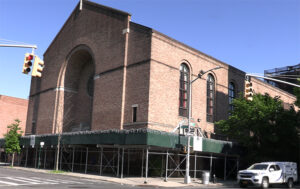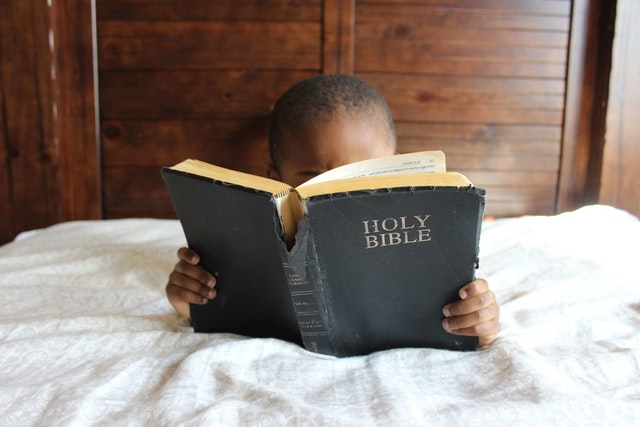Lesson 46 –
Zephaniah 1:7, 12-18
1 Be silent before the Lord God!
For the day of the Lord is at hand;
the Lord has prepared a sacrifice,
he has consecrated his guests.
12 At that time I will search Jerusalem with lamps,
and I will punish the people
who rest complacently on their dregs,
those who say in their hearts,
“The Lord will not do good,
nor will he do harm.”
13 Their wealth shall be plundered,
and their houses laid waste.
Though they build houses,
they shall not inhabit them;
though they plant vineyards,
they shall not drink wine from them.
The Great Day of the Lord
14 The great day of the Lord is near,
near and hastening fast;
the sound of the day of the Lord is bitter,
the warrior cries aloud there.
15 That day will be a day of wrath,
a day of distress and anguish,
a day of ruin and devastation,
a day of darkness and gloom,
a day of clouds and thick darkness,
16 a day of trumpet blast and battle cry
against the fortified cities
and against the lofty battlements.
17 I will bring such distress upon people
that they shall walk like the blind;
because they have sinned against the Lord,
their blood shall be poured out like dust,
and their flesh like dung.
18 Neither their silver nor their gold
will be able to save them
on the day of the Lord’s wrath;
in the fire of his passion
the whole earth shall be consumed;
for a full, a terrible end
he will make of all the inhabitants of the earth.
BACKGROUND
This passage (and the book of Zephaniah in general) has an urgent and zero-tolerance feel. Frequently, the prophet uses language like “the day of the Lord,” referencing a day of judgement. People often refer to the God of the Old Testament as the “God of Wrath,” and to the God of the New Testament as the “God of Grace.” While that might feel like a neat way to compare the two halves of the Christian holy text, doing so isn’t accurate. Remember, our Jewish siblings use the books we call “The Old Testament” as a central foundational text. And yet, we know that there are people across the world who practice Judaism beyond those binaries. For your own edification, check out the website of Rabbi Sandra Lawson, whose unique position as a Black Gay woman offer her a perspective into a long-standing tradition of social justice. Click here for more.
As you read this passage, resist the temptation to see God as vengeful before Jesus and gracious after Jesus. Take the time to make connections rather than making contrasts. Whose voice can you hear today? How do prophets tend to show up in our communities?
Today’s lesson will focus on the futility of material wealth.
Read the scripture out loud together. Discuss with someone in your home. What would you do if money were no object?
WHAT’S HAPPENING DURING THIS PASSAGE?
Much like other prophetic texts, this passage speaks in simultaneously clear and clouded terms. God, through the mouth of the prophet, says that Jerusalem will be “searched with lamps.” People will be punished for “resting complacently.” Wealth will be destroyed, and houses will be, too. Even worse, the resources that exist will be impossible to access, like vineyards. The people are warned that the “great day of the Lord” is near, and even more, it will be “bitter.” For several lines, the writer talks about a “day of wrath,” “a day of distress and anguish,” a day of ruin and devastation,” a “day of darkness and gloom,” a “day of clouds and thick darkness,” a day of “trumpet blast and battle cry.” The passage ends with the warning that neither gold, nor silver will save them on the day of “the Lord.” Certainly, in those days, the “whole earth shall be consumed for a full and terrible end.”
WHAT DOES MATERIAL WEALTH DO?
Wealth can insulate many people from most things. It can buy coronavirus testing, especially when you’re shooting a music video (like American entertainer Cardi B. has mentioned). It can buy houses. It can buy land. Money can buy special medicines and remedies to combat illnesses that most people will die from. It can buy food. It can buy entrances into college. It can pay doctors to be on call. But if, for example, there is a natural disaster that devastates an entire region, there is no credit card that hurricanes accept as payment. There is no stock option that earthquakes will take as collateral.
We should be clear that while we may all be enduring the historic event of this pandemic together; we are not all experiencing it the same. Some people have been able to fly their entire families to islands to escape risk, while others simply pray that they will not bring the virus home to loved ones after working at the hospital or grocery store.
WHY DO PROPHETS ALWAYS SOUND SO ANGRY?
This text is a prophetic poem. As Pastor Simpson reminds us often, there are different genres of biblical texts. This passage has rich imagery and is full of metaphors that feel like they’re about to come true today. Consider, however, that prophets stand in the tradition of being outside the establishment. Prophets do not have official titles like “Director of Prophecy,” nor are they on anyone’s payroll. They are frequently outcasts in society, and their words often get misinterpreted and maligned by those in power. Sadly, even today, prophets are not honored until they are dead. The power of this prophetic book is the proclamation that, eventually, a new social order will emerge. Justice and righteousness will be the order of the day.
In your own devotional period, check out chapter 3. God promises to “deal with all who oppressed you” and also promises to “restore your fortunes before your very eyes.” People may read prophets as angry, but they have given us visions for a better way of living.
HOW WILL THE LORD SEARCH PEOPLE?
In this passage, the Lord promises to “search Jerusalem with lamps.” This very word can be found elsewhere in Psalm 119, where the psalmist says the word is a “lamp unto my feet and a light unto my path.” In this context, the Word becomes something that illuminates our actions. We feed the hungry, clothe the naked, support the lonely, make room for the stranger because the Word reminds us that these are good things to do. They’re also just the right things to do in any circumstance.
What if the rubric by which God judged was through God’s vision for justice? What if God searched for Us the way we search for God? In other words, what if God searched us, not to see if we were “teacher’s pets who get to go to recess?” What if instead, God searched us to see if we were kind, compassionate, and willing to dream a brand-new day?
What questions do you still have of this scripture?
How will you commit to journeying with this text this week?
 Connection to Today’s World
Connection to Today’s World
You are the connection to today’s world! Earlier this year, The Concord Baptist Christfund, established by the Concord Baptist Church of Christ made the decision this year to partner with RIP Medical Debt. With a $35,000.00 investment, we were able to eradicate over $4 million dollars of oppressive medical debt. The average debt hovered at about $1500.00 per recipient in Brooklyn. The random forgiveness notices will allow people to repair credit history, save, and tap into resources that were otherwise inaccessible.
Whether we are in a global pandemic or not, healthcare is a right. In Pastor Simpson’s comments, “healthcare cannot be a luxury for the rich, it is a human right.” In order to build a more just world, there are some things that do have to be cancelled. Cancelling exploitative medical debt can make way for freedom, especially when contrasted with debt collectors who profit from buying debt from vulnerable people.
Journal: What are your fears about money?
Closing: Sing/watch “Someday We’ll All Be Free,” Donny Hathaway
Hang on to the world as it spins around
Just don’t let the spin get you down
Things are moving fast
Hold on tight and you will last
Keep your self respect, your [human] pride
Get yourself in gear
Keep your stride
Never mind your fears
Brighter days will soon be here
Take it from me, someday we’ll all be free
Keep on walking tall
Hold your head up high
Lay your dreams right up to the sky
Sing your greatest song
And you’ll keep going, going on
Take it from me, someday we’ll all be free
PRAYER:
Dear God,
You are the God who provides. You are also the God who searches out those who exploit.
We are hunkering down for yet another wave of Coronavirus cases. We pray that those who are essential workers get the grace needed. We pray that those who are not essential workers have needs met and rent paid.
Help us, dear Lord, to find new ways to share with each other. Help us to resist the spirit of hoarding, of keeping things we don’t need, of amassing more resources than we can reasonably use.
In Jesus’ name we pray, Amen.
Works Cited:





